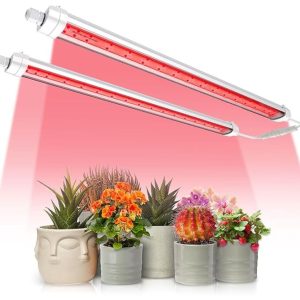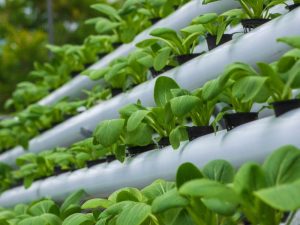Last Updated on January 24, 2024 by teamobn
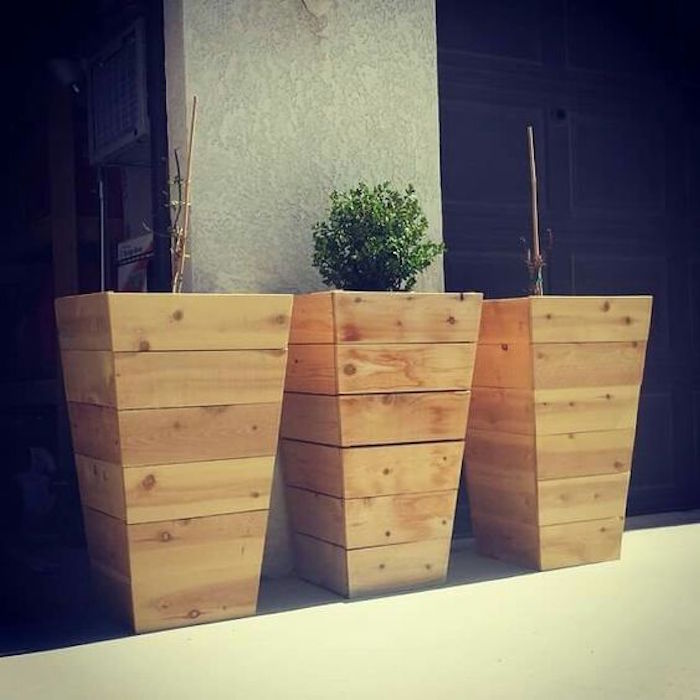
Are you looking for something that will add “oomph” to your garden or patio? Building these DIY tall planters is a simple and fun project you can do all by yourself. Plus, it’s so inexpensive it just costs about $20.
Studies have proven that house plants improve concentration and productivity, reduce stress levels, and boost your mood. That’s why we like having them around our homes.
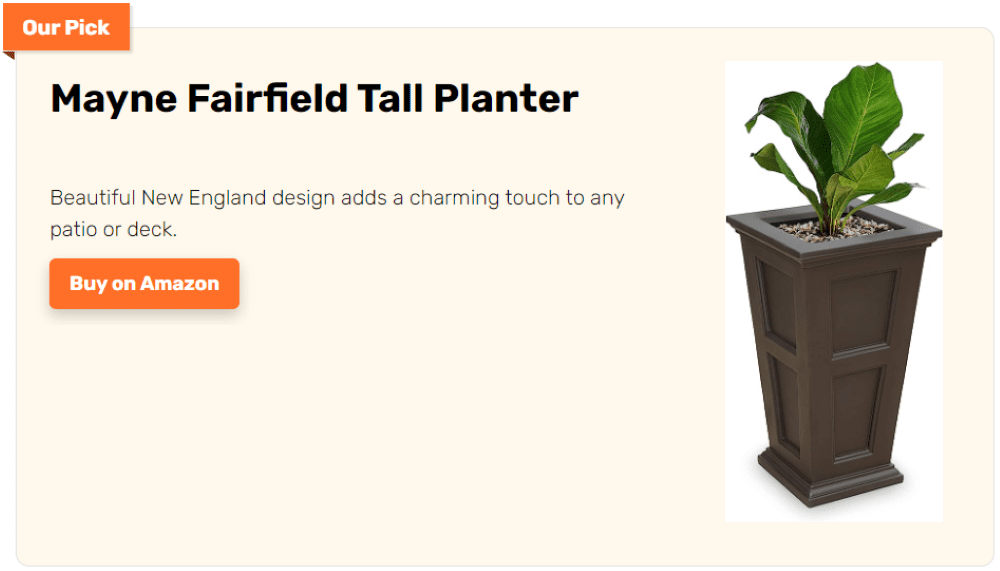
With these tall planters, you can easily place plants and flowers anywhere you want them without having to dig them up from the ground. And they’re very versatile, too! Use them to define your walkway or as eye-catching accents at the door. You may also use them as some sort of privacy screen or as a wall to divide areas in your garden.
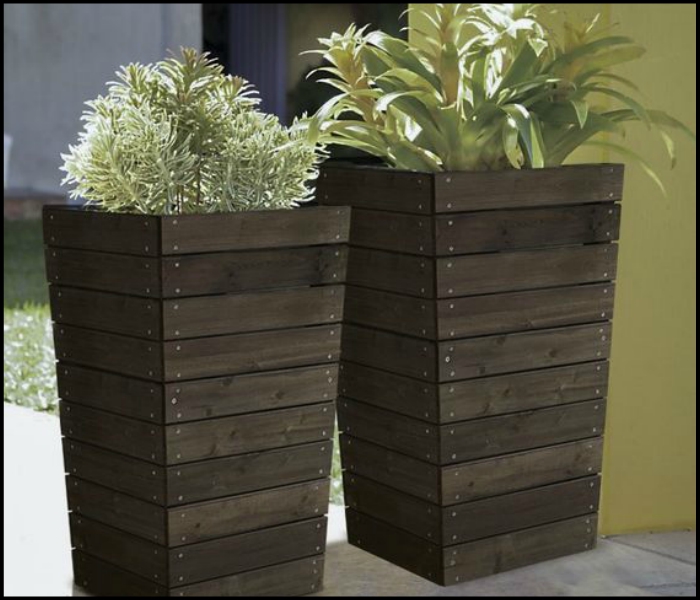
Of course, you can just go and buy tall planters from sites like eBay, but where’s the fun in doing that? And I haven’t started on the price tag just yet – the cheapest one I found retails for $60! Sixty bucks! Come on, guys. The choice is a no-brainer.
Although it will take a bit of woodwork to get this together, it shouldn’t hold you back from creating this amazing DIY tall planter.
Have you made a DIY tall planter before? Tell us about it! If not, then get to work and dress up your garden with these tall planters!
Building Tall Planters
Contents
- 1 Building Tall Planters
- 2 Benefits of Tall Planters in Small Spaces
- 3 Maintenance and Care for Tall Planters
- 4 Seasonal Decoration Ideas for Tall Planters
- 5 FAQ on Building DIY Tall Planters
- 5.1 What materials do I need to build a tall planter?
- 5.2 What tools are required for this project?
- 5.3 How do I protect my tall planter from weather damage?
- 5.4 Can these planters be used indoors?
- 5.5 Are tall planters suitable for growing vegetables?
- 5.6 How often should I clean my tall planter?
- 5.7 Can I customize the design of my tall planter?
- 5.8 What are some ideal plants for tall planters?
- 5.9 Do tall planters need special soil?
- 5.10 How can I make my tall planter more mobile?
- 6 Conclusion
Materials
- 8 dog ear pickets
- 15in square plastic planter
- brad nailer
- wood glue
- wood stain or paint (color of choice)
Tools:
- table saw
Instructions:
Step 1: Cut the Pickets
Begin by cutting the dog ear pickets to the desired height of your planter. If your plastic planter is 15 inches tall, you might want the wood height to be around 30 inches for a tall planter. Use the table saw for precise cuts. Ensure all pieces are of equal length.
Step 2: Assemble the Frame
Lay out the pickets side by side to form the four sides of your planter. Apply wood glue along the edges and use the brad nailer to secure them together. Create four panels for all sides of your planter.
Step 3: Attach the Panels
Once the glue dries, attach the four panels to form a box. Use the brad nailer to secure each corner. Make sure the box is square and the corners are aligned.
Step 4: Insert the Plastic Planter
Place the 15-inch square plastic planter inside the wooden box. It should fit snugly. This plastic planter will hold the soil and plants, protecting the wood from moisture.
Step 5: Finishing Touches
Sand any rough edges for a smooth finish. Apply wood stain or paint to the exterior of the wooden planter. This adds a personal touch and helps protect the wood from the elements. Let it dry completely.
Step 6: Planting
Your tall planter is ready for use once the paint or stain is dry. Add soil and plants to the plastic planter. Arrange it in your desired location.
Benefits of Tall Planters in Small Spaces
Tall planters are a smart choice for people who love gardening but have limited space. They offer unique advantages, especially in small areas like balconies, patios, or compact gardens. Here are some key benefits of using tall planters in small spaces.
Maximizing Limited Space
Tall planters are a boon for those with small living spaces. They cleverly utilize vertical space, often overlooked in small gardens or balconies. By drawing the eye upwards, these planters create a sense of more room, making your space feel less cramped.
Efficient Use of Vertical Space
The beauty of tall planters lies in their ability to expand gardening space vertically. They allow you to layer plants at different heights, adding depth and dimension to your garden. This vertical arrangement is not only practical but also visually appealing, giving a tiered garden effect.
Growing More in Less Area
With tall planters, you can grow a variety of plants in a limited area. They are perfect for small-scale gardening, allowing you to cultivate herbs, flowers, and even small vegetables. This maximizes your gardening potential without needing additional ground space.
Ideal for Compact Living Areas
Tall planters are a perfect fit for those living in apartments or homes with small patios. They provide the joy of gardening without the need for a large yard. These planters make it possible to have a mini garden in a confined space, bringing nature closer to your living area.
In essence, tall planters offer a smart solution for making the most of small spaces. They enable you to enjoy a diverse range of plants and create a green oasis, regardless of your living situation’s spatial limitations.
Enhancing Aesthetics
Tall planters are not just functional; they are also powerful tools for enhancing the aesthetic appeal of any space. Their ability to add height and structure transforms outdoor areas into visually captivating spots.
Creating Visual Impact
The height of tall planters naturally draws the eye upward, creating a striking visual impact. This vertical element can break the monotony of a flat landscape, adding layers and interest. Whether you choose sleek, modern designs or rustic, wooden ones, these planters are statement pieces that enhance the overall look of your space.
Serving as Focal Points
Tall planters can create focal points in your garden or patio. Placing a tall, striking planter in a strategic spot can direct attention and set the tone for the rest of the area. They are perfect for highlighting special plants or for showcasing unique design elements.
Stylishly Dividing Spaces
In addition to their decorative value, tall planters are excellent for elegantly dividing spaces. They can separate different areas of your garden or create a sense of privacy on a balcony. This division is not just functional but also adds to the charm and character of the space.
Versatility in Design
The versatility of tall planters allows them to fit into any design theme. From minimalistic and modern to traditional and ornate, a planter style suits every taste. They can be coordinated with the existing decor to create a harmonious and inviting outdoor area.
Tall planters are a fantastic choice for enhancing the aesthetics of small spaces. They bring height, structure, and style, transforming any area into a more attractive and enjoyable place. With their versatility and visual appeal, tall planters are an essential element for anyone looking to beautify their outdoor living space.
Improved Accessibility
Tall planters offer a significant advantage in terms of accessibility, making gardening an enjoyable activity for everyone. Their design caters to comfort and ease, removing the physical strain often associated with traditional gardening.
Easier to Reach and Maintain
The elevated height of tall planters means less bending and stooping. This is a relief for those who have back problems or mobility issues. Gardening tasks like planting, weeding, and watering become much easier. You can tend to your plants while standing or sitting comfortably, making the gardening experience more pleasant.
Inclusive Gardening Experience
Tall planters are inclusive. They are ideal for senior gardeners or individuals with physical limitations. These planters ensure that gardening remains a hobby accessible to all, regardless of age or physical condition. Everyone can enjoy the therapeutic benefits of gardening without the physical strain.
Perfect for Urban Settings
In urban environments where space is limited, tall planters are especially beneficial. They allow city dwellers to engage in gardening without needing much ground space. This accessibility encourages more people to start gardening, fostering a connection with nature even in urban settings.
Safe for Children
Tall planters offer families with young children a safer and more accessible way for kids to learn about gardening. They provide a comfortable height for children to plant, water, and observe the growth of their plants. This makes gardening a more family-friendly activity, nurturing a love for plants from a young age.
These planters greatly improve the accessibility of gardening. They make engaging in this rewarding hobby easier and more comfortable for people of all ages and abilities. By reducing physical barriers, tall planters open up the world of gardening to a wider audience, enriching lives and spaces alike.
‘Click on any image to start lightbox display. Use your Esc key to close the lightbox. ?’
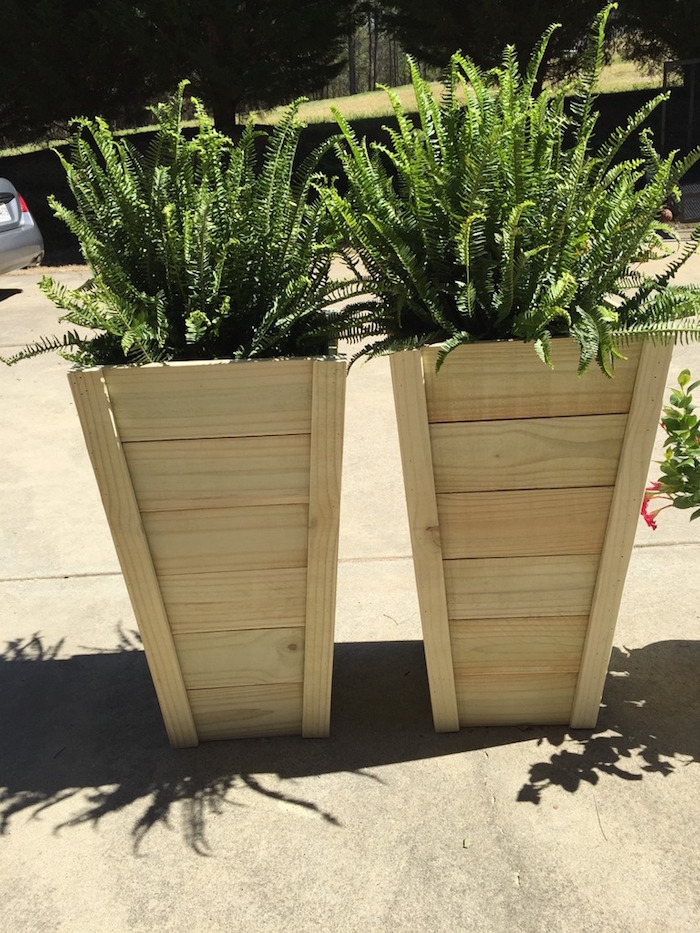
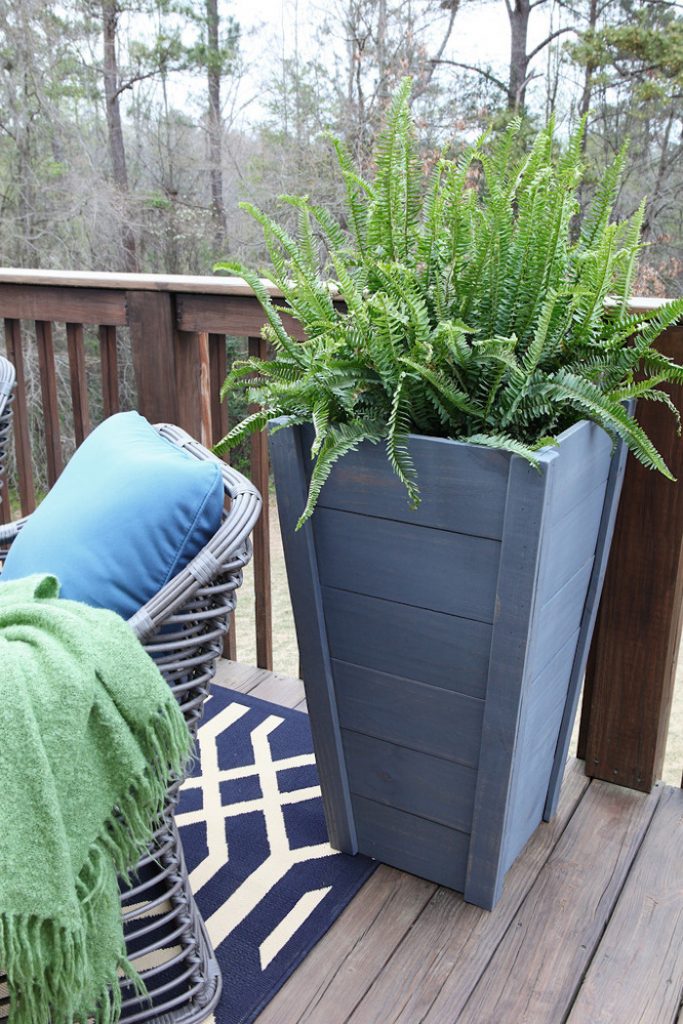


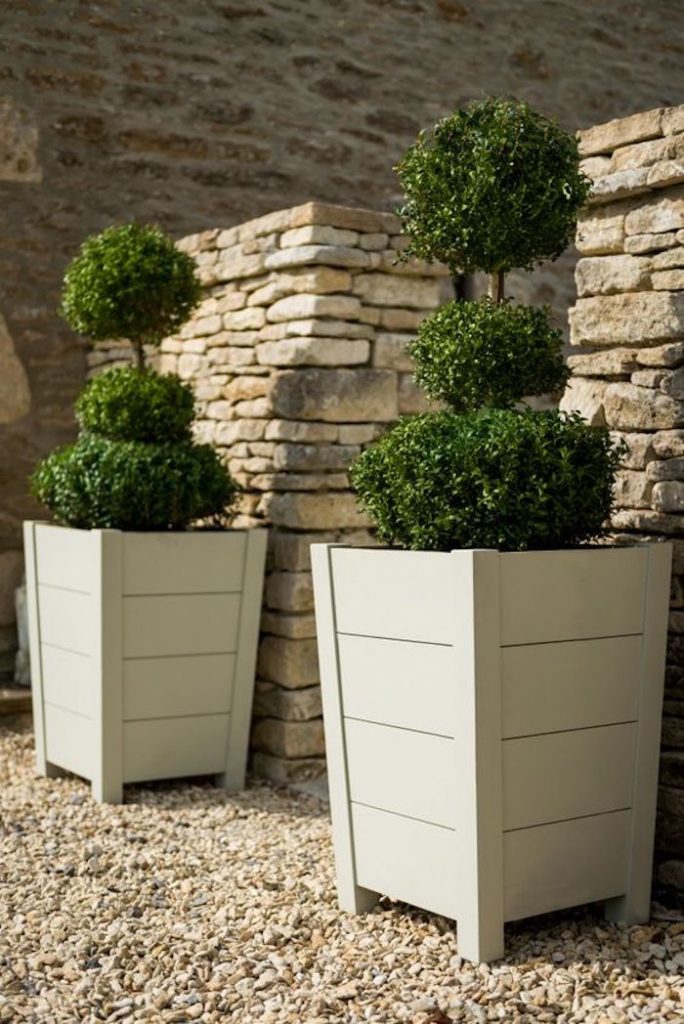
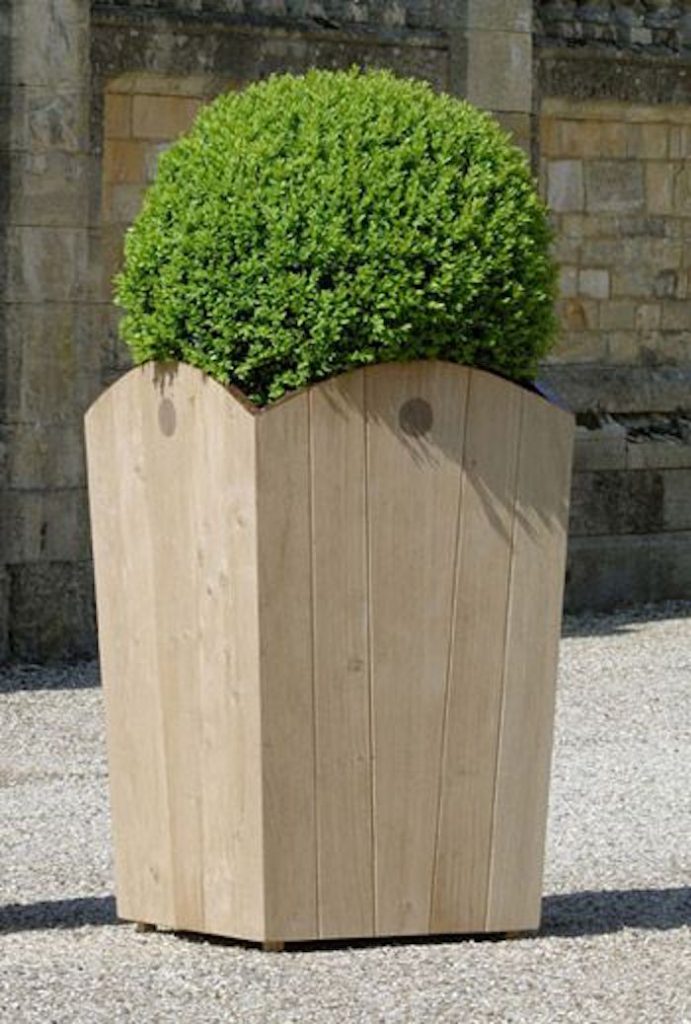
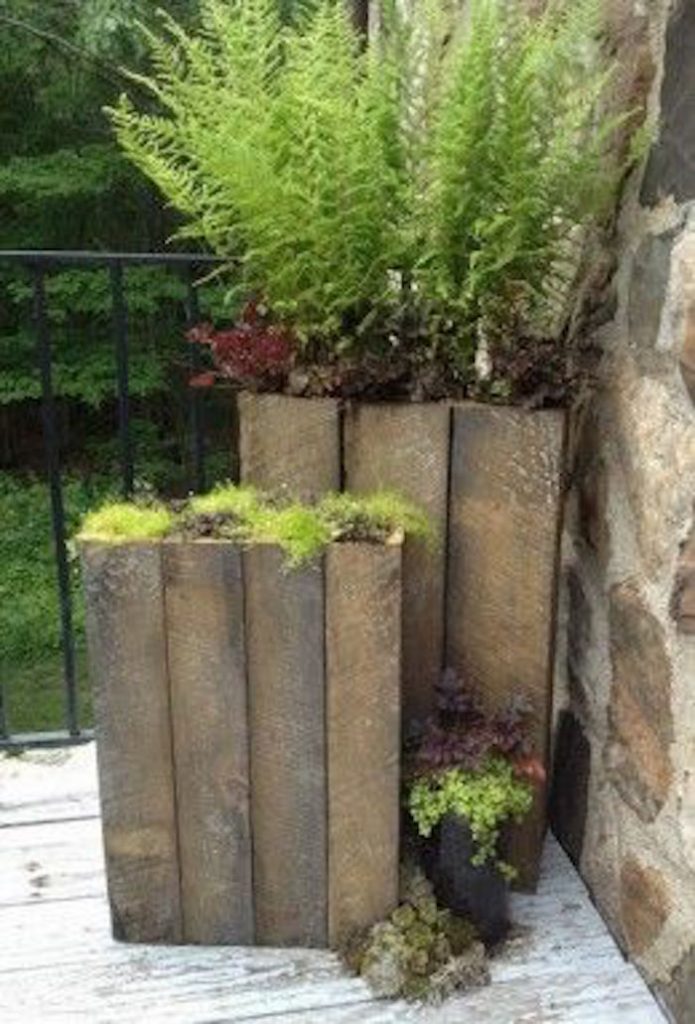
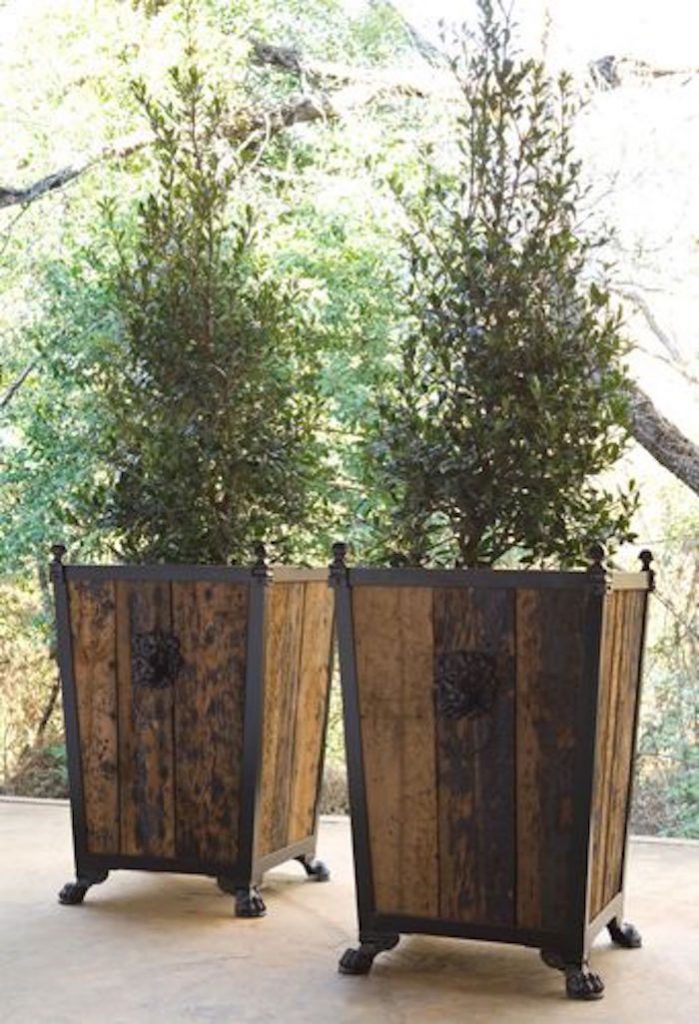
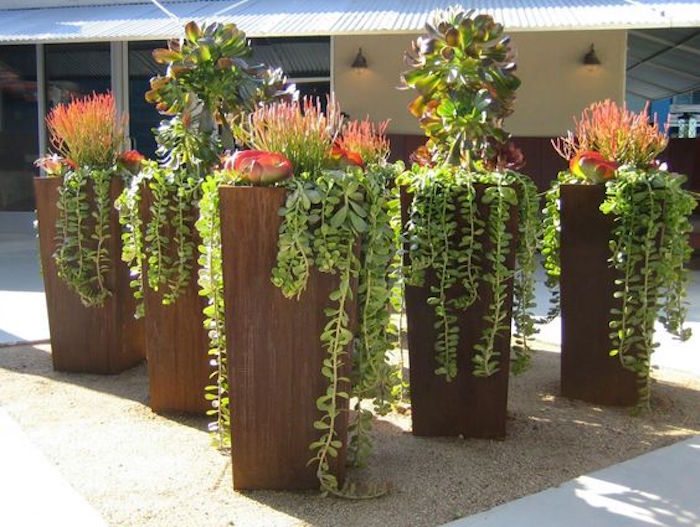
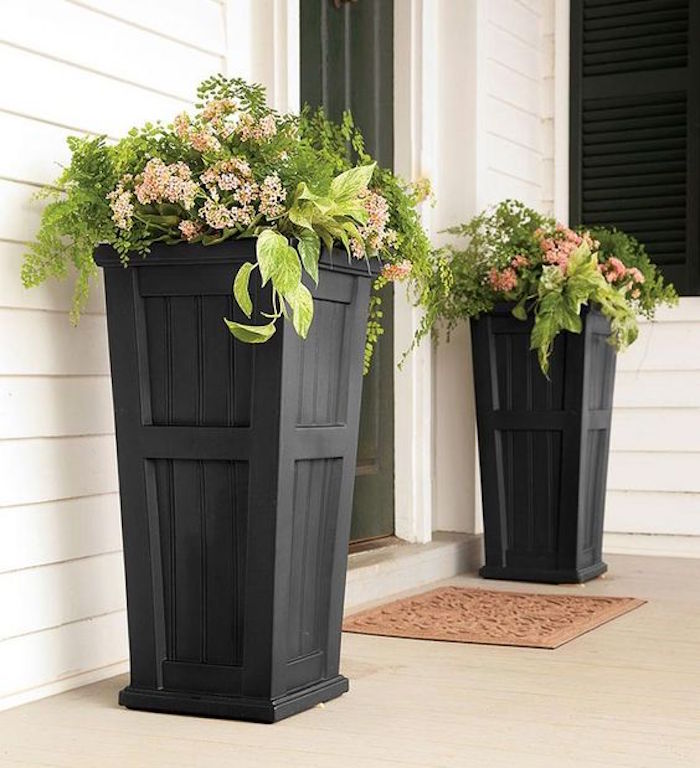
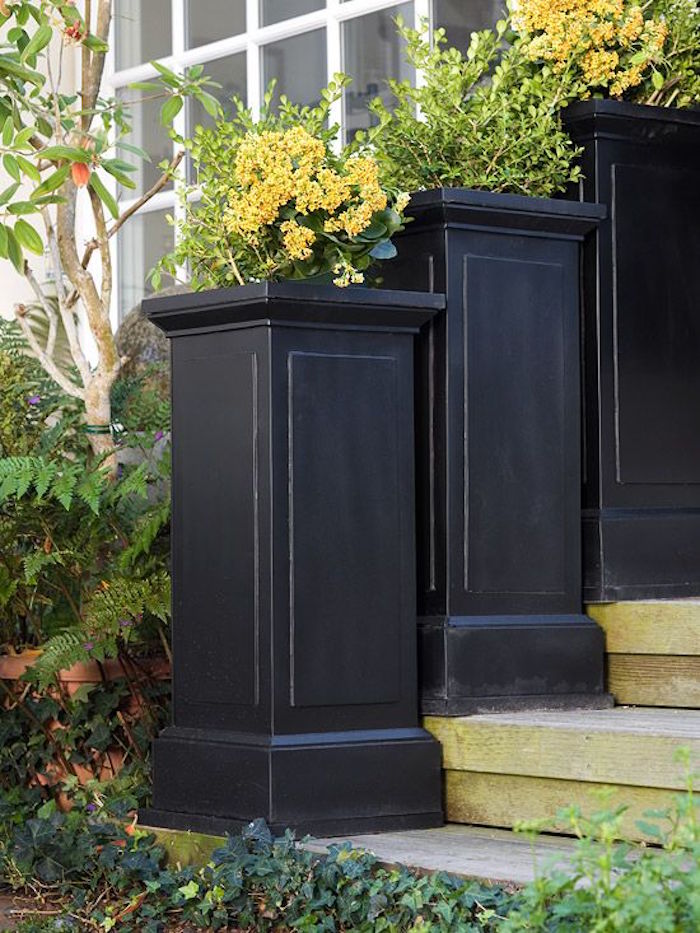
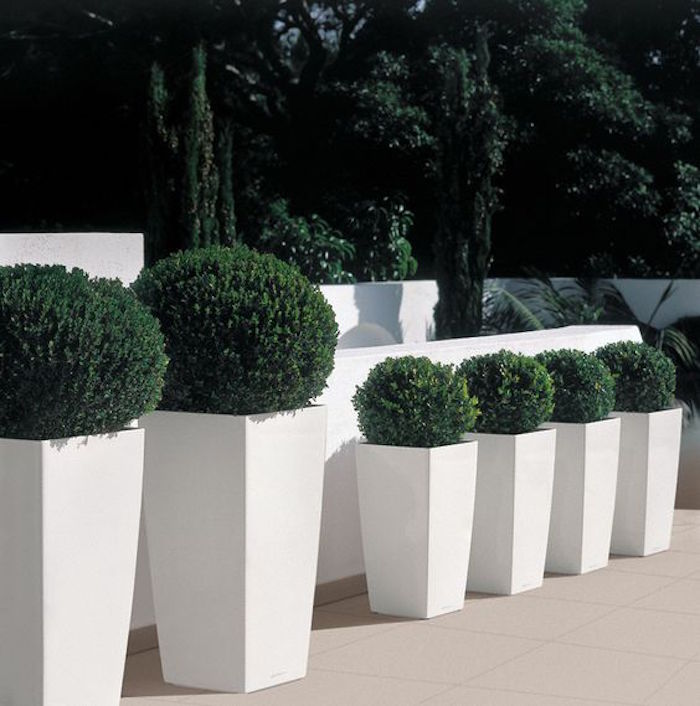
Maintenance and Care for Tall Planters
Proper maintenance and care are key to ensuring your tall planters remain beautiful and functional for years. Regular upkeep enhances their appearance and promotes the health of the plants they house. Here’s how to keep your tall planters in top shape.
Regular Cleaning
Keeping tall planters clean maintains their appearance and supports the health of the plants they contain. Over time, dirt, dust, and organic matter like fallen leaves can accumulate on the planter’s surface, potentially leading to staining and watermarks.
- For Wooden Planters: Use a soft brush and mild soapy water to gently scrub the surface. This method is effective in removing grime without damaging the wood. Avoid harsh chemicals or abrasive materials that strip the protective coating or paint.
- For Metal or Plastic Planters: A damp cloth is usually enough to wipe away dirt. For stubborn stains, a mild detergent can be used. It’s important to avoid abrasive scrubbers, as they can scratch the surface of metal or plastic planters.
After cleaning, it’s crucial to rinse the planters thoroughly. This removes any soap residue that could harm plant roots. Let the planters dry completely before returning the plants to avoid trapping moisture against the planter’s surface, which can cause decay in wooden planters or rust in metal ones.
Checking for Drainage
Proper drainage is crucial for preventing water buildup in the soil, which can lead to root rot, a common problem in overwatered plants.
- Inspect Drainage Holes: Regularly check that the drainage holes at the bottom of the planter are free from blockages. Soil, roots, or debris can obstruct these holes over time.
- Clearing Blockages: Use a tool like a screwdriver or a small brush to gently remove any blockage. Be careful not to damage the planter or roots of the plants.
- Improving Drainage: If the soil remains soggy or waterlogged despite drainage holes, consider drilling additional holes. More holes provide better water flow, preventing excess water from escaping easily.
- Drainage Layer: Adding a layer of gravel or broken pottery at the bottom of the planter before adding soil can also improve drainage. This layer creates space for excess water to pool away from the roots.
Protecting from Weather
Tall planters, especially those made from wood or certain metals, need protection from extreme weather conditions. Weather elements can cause significant damage over time.
- Shelter During Harsh Weather: In conditions like heavy rain, snow, or intense sun, move your planters to a sheltered area. This could be under a patio cover, greenhouse, or indoors. Protecting them from severe weather prevents warping, fading, and other damage.
- Using Bases with Wheels: Consider mounting them on bases with wheels for heavier planters. This makes it much easier to move them to protected areas when needed. Wheeled bases also facilitate rotating the planters for even sun exposure or rearranging your space for different occasions.
Seasonal Care
Different seasons bring different challenges for maintaining tall planters.
- Treating Wooden Planters: Annually applying a weather-resistant sealant to wooden planters is crucial. This sealant is a barrier against moisture and UV rays, preventing rotting, warping, and fading. Choose a sealant appropriate for the type of wood and the specific outdoor conditions it will face.
- Maintaining Metal Planters: Regularly check metal planters for rust, a common problem in damp environments. If you spot rust, treat it immediately. Use a wire brush to remove rust and apply a rust-inhibiting primer and paint. This not only restores the planter’s appearance but also prevents further corrosion.
Inspecting for Damage
Regular inspection is key to prolonging the life of your tall planters.
- Check for Cracks or Splits: Look for signs of cracking or splitting in wooden planters. Small damages can often be repaired with wood filler or sealant. Catching these issues early prevents them from becoming bigger problems.
- Monitor Overall Condition: Keep an eye on the overall health of your planters. Look for signs of wear like loose joints, fading paint, or deteriorating material. Addressing these issues promptly helps maintain your planters’ structural integrity and appearance.
Following these maintenance and care tips, your tall planters will remain a beautiful and functional part of your garden or patio for many seasons. Regular upkeep preserves their appearance and ensures a healthy environment for your plants.
Seasonal Decoration Ideas for Tall Planters
Decorating your tall planters according to the seasons can add a festive and dynamic touch to your outdoor or indoor space. With creative ideas for each season, you can transform your tall planters into eye-catching pieces that reflect the time of year.
Spring Refresh
- Bright Flowers and Pastels: Celebrate the arrival of spring with vibrant flowers. Think tulips, daffodils, and hyacinths. Use pastel-colored ribbons or paint to adorn the planters, complementing the fresh blooms.
- Easter Theme: Decorate with Easter motifs. Add artificial bird nests, painted eggs, and small bunny figurines among the plants.
Summer Vibrance
- Tropical Theme: Embrace summer with a tropical theme. Plant bright flowers like hibiscus or marigolds. Use colorful decorations like small umbrellas or flamingo figurines.
- Beach Vibes: Create a beach-themed planter. Use seashells, starfish, and sand-colored ribbons to give a seaside feel.
Autumn Warmth
- Fall Foliage: Incorporate autumnal colors with chrysanthemums and ornamental kale. Add decorations like pinecones and faux fall leaves.
- Halloween Spirit: Get creative with Halloween decorations. Think mini pumpkins, spooky figurines, and themed lights.
Winter Wonderland
- Festive Flair: Embrace the holiday spirit. Use evergreen branches, red berries, and twinkling lights. Add festive ornaments for extra sparkle.
- New Year’s Theme: Welcome the New Year with silver and gold decorations. Add small lanterns or candles for a warm, inviting glow.
Seasonal decorations for your tall planters enhance their appeal and keep your space fresh and current. These ideas can be easily adapted to suit your style and the specific holidays or traditions you celebrate throughout the year.
FAQ on Building DIY Tall Planters
What materials do I need to build a tall planter?
What tools are required for this project?
How do I protect my tall planter from weather damage?
Can these planters be used indoors?
Are tall planters suitable for growing vegetables?
How often should I clean my tall planter?
Can I customize the design of my tall planter?
What are some ideal plants for tall planters?
Do tall planters need special soil?
How can I make my tall planter more mobile?
Conclusion
Incorporating tall planters into your space offers numerous benefits. They maximize limited areas, enhance aesthetic appeal, improve accessibility, and are relatively easy to maintain. With the added flexibility of seasonal decorations, these planters become more than just containers for your plants; they transform into dynamic elements of your home’s decor.



